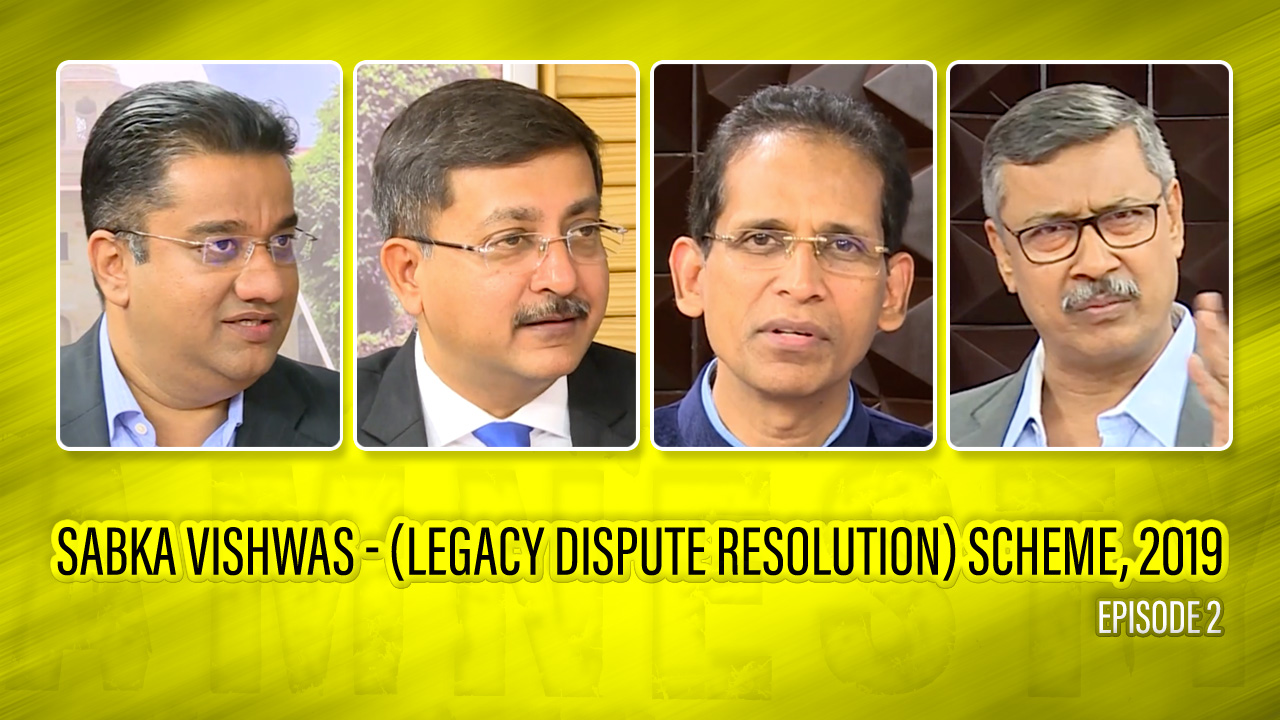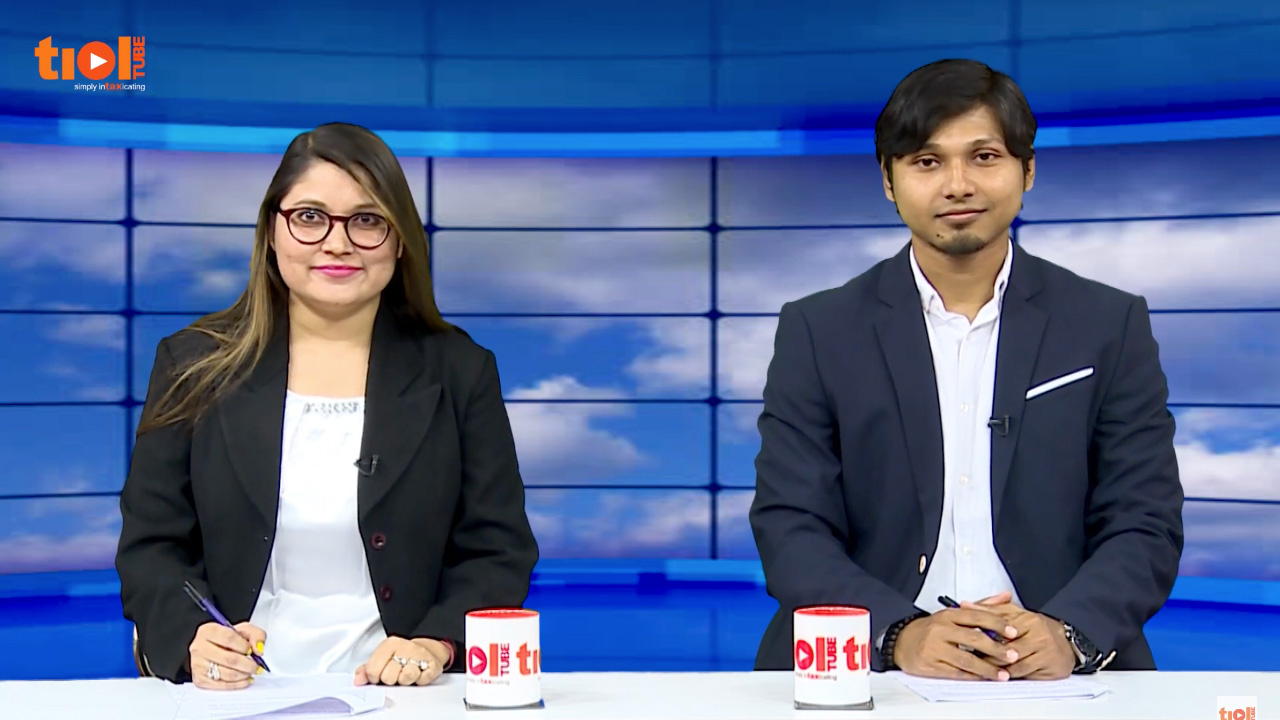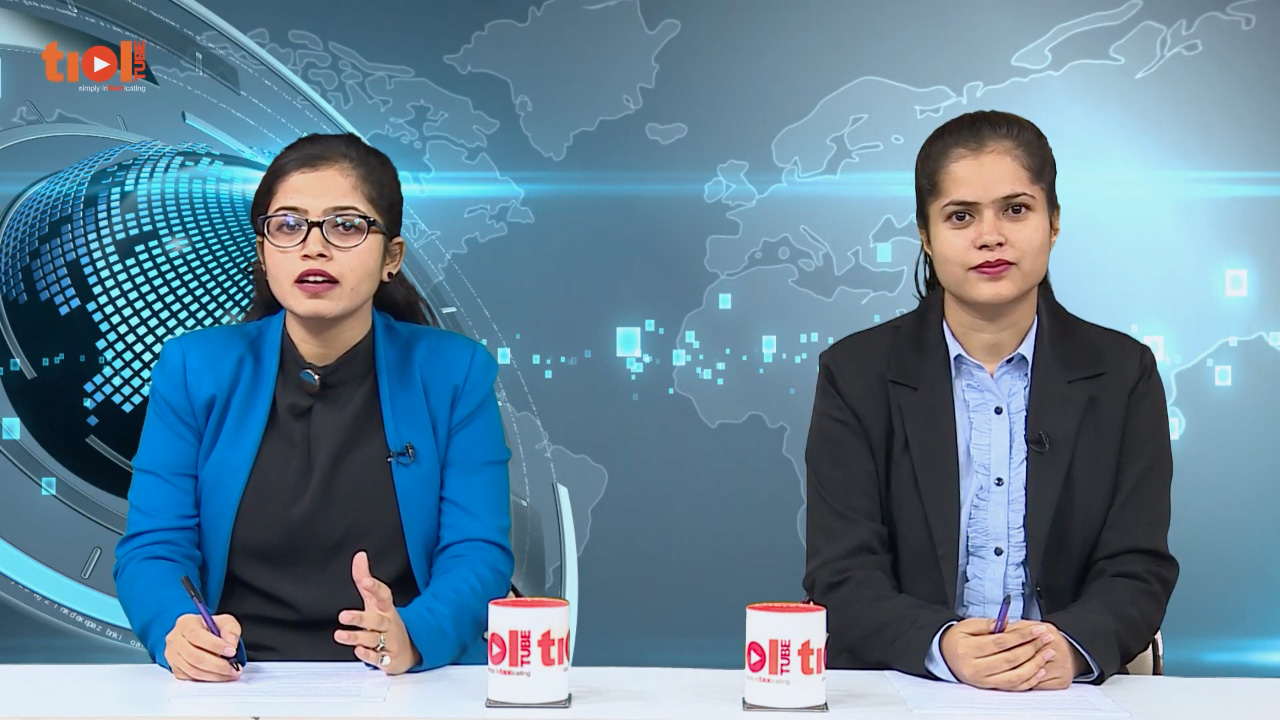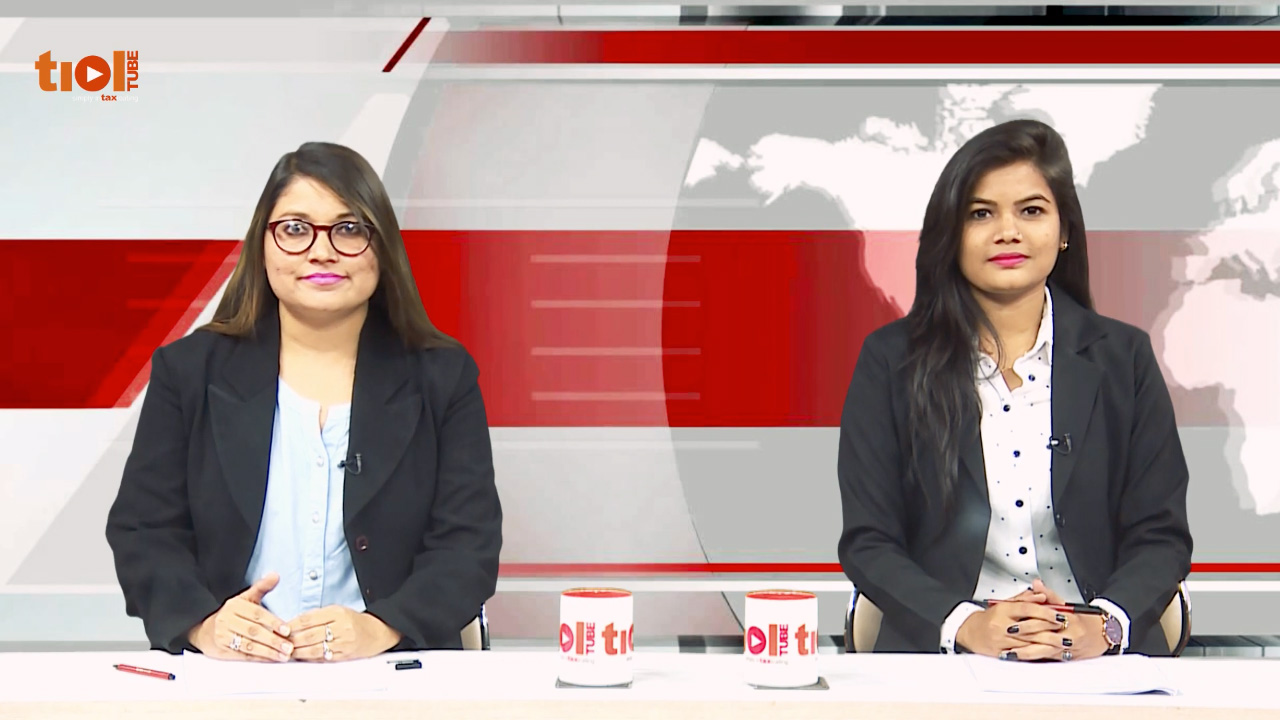|
SERVICE TAX
ST - The assessee is a registered C & F Agent and is discharging his service tax liability accordingly - The first issue relates to the inclusion of reimbursable expenses in the value of taxable services, which according to assessee is not includible in the light of Supreme Court's decision in case of Intercontinental Consultants and Technocrats Pvt. Ltd. - 2018-TIOL-76-SC-ST wherein the provisions of Rule 5 of Service Tax Valuation Rules was held as ultravires - Further, a part of demand stands confirmed by denying the benefit of Cenvat credit of duty availed on various inputs services like GTA Service and Care Insurance Services - The matter is required to be reconsidered by the Original Adjudicating Authority in the light of subsequent declaration of law by Supreme Court in the case of Intercontinental Consultants and Technocrats Pvt. Ltd. - Similarly, the availability of Cenvat credit is also required to be re-examined afresh - For the said purpose, the impugned order is set aside: CESTAT
- Matter remanded: ALLAHABAD CESTAT
ST - The assessee was providing taxable service under category of 'construction service' - During the period from July 2011 to March 2012, assessee was discharging Service Tax liability on the basis of receipt of payment instead of accrual basis as required by Point of Taxation Rules, 2011 - Therefore, audit objection was raised against the assessee - Before issue of SCN, differential Service Tax and interest thereupon were paid by assessee, therefore as provided under sub-section 3 of section 73 of Finance Act, 1994 there was no provision for issue of SCN - The impugned order confirming imposition of penalty under section 78 of FA, 1994 is not sustainable and the same is set aside so far as penalty is concerned: CESTAT
- Appeal allowed: ALLAHABAD CESTAT
ST - Appellant had paid freight to "Goods Transport Agency" during the relevant period. It was, therefore, required to pay Service Tax on the amount received under 'Transport of Goods by Road Service by Reverse Charge Mechanism: CESTAT [para 20]
ST - Though the Adjudicating Authority was not justified in confirming the demand under ECIS, but the appellant had admittedly collected Service Tax - The appellant is also not contesting that it is not required to deposit the Service Tax collected with the Department but what is sought to be contended is that the appellant had in addition to the amount that has been appropriated in the impugned order, they have deposited an amount of Rs. 16,614,934/- with the Department, which amount has not been considered by the Adjudicating Authority and, therefore, not appropriated.
Held: This is a factual aspect which can be examined by the Adjudicating Authority - The appellant may produce the relevant documents before the Adjudicating Authority so that it can determine whether this amount has been deposited by the appellant or not - so also, in the matter of refund on the ground that what has been deposited by the appellant is much more than the tax the appellant had collected, this issue also needs to be examined by the Adjudicating Authority - matter needs to be remanded to the Adjudicating Authority for passing an appropriate order - exercise should be completed by the Adjudicating Authority expeditiously and preferably within three months - confirmation of demand under heading ECIS with interest and penalty is set aside - The demand made under "Goods and Transport Agency Service" is maintained - Appeal disposed of: CESTAT [para 22, 23]
- Appeal disposed of: DELHI CESTAT
ST - Issue involved is taxability of sales commission paid by the appellant to overseas Sales Commission Agent under reverse charge mechanism, in terms of Section 66A of Finance Act, 1994.
Held: During the relevant period, in the light of the Hon'ble Punjab & Haryana High Court judgment in the case of Ambika Overseas - 2011-TIOL-951-HC-P&H-ST , the appellant was entitled for the Cenvat credit in respect of the service tax payable on commission paid to overseas commission agent - Therefore, even if the service tax was payable, there was a Revenue neutral situation - since there is no gain to the appellant, it cannot be said that there was malafide intention on the part of the appellant in non-payment of service tax - Therefore, extended period was clearly not invokable in the facts of the present case - Accordingly, the demand for the longer period is set aside and the demand, if any, for the normal period is maintained: CESTAT [para 5]
ST - Penalty - Penalty imposed under Section 78 is also not sustainable in view of the findings on the tax demand - As regards the penalty imposed under Section 76, the same is also not sustainable in the light of the judgment of Gujarat High Court in the case of Raval Trading Company - 2016-TIOL-112-HC-AHM-ST same is also set-aside: CESTAT [para 6]
- Appeal partly allowed: AHMEDABAD CESTAT
ST - From the purchase order and inovice issued, it is evident that the place of removal was the factory gate and the appellant had arranged transportation for delivery of the goods at the buyer's factory - appellant is governed under the definition of amended provisions Rule 2(l) of the Cenvat Credit Rules, 2004 (effective from 01.03.2011 - issue, as to whether, buyer's premises should be considered as place of removal for the benefit of Cenvat credit of service tax paid on GTA service was dealt with by the Supreme Court in the case of Ultra Tech Cement Ltd. - 2018-TIOL-42-SC-CX , holding that Cenvat credit on goods transport agency service availed for transport of goods from place of removal to buyer's premises was not admissible - following the same, impugned order denying the credit is upheld and the appeal is dismissed: CESTAT [para 3, 4]
- Appeal dismissed: MUMBAI CESTAT
CENTRAL EXCISE
2019-TIOL-2503-HC-DEL-CX
CCE & ST Vs Nanglamal Sugar Complex
CX - Show Cause Notice alleged that, as the respondent was manufacturing dutiable goods (sugar and molasses) as well as exempted goods (bagasse and electricity), using common inputs and input services, the duty/service tax paid whereon Cenvat Credit had been availed; and was neither maintaining separate accounts and inventory, in respect of the inputs, and input services, used in the manufacture of the dutiable, and exempted goods; nor reversing the Cenvat Credit of the duty, and service tax, paid on the manufacture of the exempted goods (bagasse and electricity), in accordance with the procedure stipulated in Rule 6 (3A) of the Cenvat Credit Rules, the respondent was liable to pay an amount equal to 10% of the value of the exempted goods, for the period prior to 6th July, 2009, and 5% of the value of the exempted goods, for the period after 7th July, 2009 - As bagasse was not sold by the respondent, the Show Cause Notice demanded, from the respondent, 10%/5% of the price at which it was selling electricity - and which amount is Rs. 2,81,82,486/- - demand confirmed by Commissioner by not accepting the contention of the present respondent that it had reversed proportionate Cenvat Credit, of the inputs and input services used by it, in the manufacture of the electricity sold by it, which had been worked out, by the respondent, as Rs.3,12,722/-, along with interest, on the ground that he was unable to verify the veracity of the respondents contention regarding reversal, by it, of "proportionate" Cenvat Credit - In appeal by assessee, Tribunal merely followed its earlier decision in DSM Sugar Mills Ltd. 2014-TIOL-3001-CESTAT-DEL , which, in turn, relied on the judgment of the High Court of Allahabad in Gularia Chini Mills = 2013-TIOL-568-HC-ALL-CX and allowed the appeal of the respondent - Revenue is in appeal against this order.
Held: Tribunal has proceeded on one solitary ground, i.e., that electricity could not be regarded as "excisable goods" and the sequitur would, therefore, be that electricity would not be "exempted goods", either, for the purposes of the Cenvat Credit Rules, "exempted goods" being, per definition, excisable goods, which are either exempt from duty, or on which duty is chargeable at nil rate - the impugned Final Order of Tribunal was dictated in open court and it cannot, therefore, be said that either party, before the Tribunal, was taken by surprise - Moreover, no objection, by the Departmental Representative, who represented the Revenue before the Tribunal, to the effect that the Tribunal was deciding the appeal on a point not urged by the respondent, was taken - therefore, Bench is not inclined to accept the preliminary objection of the Tribunal having proceeded on a point not urged by the respondent - In any event, the point on which the Tribunal has decided the appeal is a point of law, i.e., the excisability, or otherwise, of electricity and which is required to be decided on the basis of the prevalent statutory position, as reflected in the Act, read with the Tariff and the law laid down on the point, and is not dependent on adjudication of any disputed question of fact - statutory provisions, if read, clearly indicate that electrical energy/electricity fell within the ambit of the expression "excisable goods" - Statutorily, therefore, there is no escape from the position, in law, that "electricity", or "electrical energy", is excisable - Supreme Court has in D.S.C.L. Sugar Ltd. - 2015-TIOL-240-SC-CX held that bagasse was in the nature of non-marketable and, consequently, non-excisable waste/residue and that, as the electricity, which was sold to UPPCL, was entirely generated from such non-excisable bagasse, the said sale could not constitute the basis for a demand under Rule 6(3)(i) of the Cenvat Credit Rules - The said reasoning, as postulated by the Supreme Court as the ground to dismiss the SLP, constitutes "law declared", within the meaning of Article 141 of the Constitution of India, and it is not open to the Bench to depart, or differ, therefrom - Supreme Court has, in D.S.C.L. Sugar Ltd. - 2015-TIOL-240-SC-CX , clearly held that bagasse is not an excisable item and, that, therefore, a demand under Rule 6 of the Cenvat Credit Rules, on the ground of sale of electricity generated from bagasse, could not sustain - inevitable sequitur of the above discussion is that the decision of the Tribunal, to allow the appeal of the respondent on the basis of the judgment of the High Court of Allahabad in Gularia Chini Mills - 2013-TIOL-568-HC-ALL-CX , was justified, albeit for the reason that, as the electricity sold by the respondent was generated entirely from bagasse, and bagasse itself was in the nature of non-excisable waste/residue, no demand, posited on Rule 6(3)(i) of the Cenvat Credit Rules, could sustain against the respondent - Revenue appeal is, consequently, dismissed: High Court
CX - Where the Supreme Court dismisses a Special Leave Petition , without granting leave but with reasons, there is no merger, but the reasons adduced by the Supreme Court for dismissing the SLP, nevertheless, constitute declaration of the law, within the meaning of Article 141 of the Constitution of India, which would be binding on all courts and Tribunals subordinate to the Supreme Court, and no such Court or Tribunal would be at liberty to take a view different from that of the Supreme Court: High Court
CX - Non-specification of any rate of duty, against a particular Sub-Heading of the Tariff, would not result in the product becoming "non-excisable" - To the extent that the judgment of the High Court of Allahabad, in Gularia Chini Mills - 2013-TIOL-568-HC-ALL-CX opines to the contrary, therefore, Bench respectfully records its disagreement - In any event, the said order was passed on an application for waiver of pre-deposit, and does not, therefore, have any real precedential value: High Court
CX - Question of law, framed, in these proceedings on 3rd December, 2018, viz. Is the CESTAT correct in holding that as electricity is not excisable, Rules 6(2) & (3) of the CENVAT Credit Rules, 2004 are not applicable and consequently input credit is admissible in the facts and circumstances of the case? is answered in the affirmative, and against the Revenue: High Court
[para 16, 20, 26, 33, 37, 38, 39, 40, 52, 57, 58, 59, 61, 62, 64, 65]
- Appeal dismissed: DELHI HIGH COURT
2019-TIOL-3151-CESTAT-DEL
A Infrastructure Ltd Vs CCE & ST
CX - The assessee-company manufactures Asbestos Cement Pressure Pipes falling under Chapter 68 of First Schedule to the CETA - Such pipes are used to carry drinking water - The Notfn No 06/2002-CE exempts products under Chapter 68 if they contain fly ash not less than 25% by weight, conditional on maintaining accounts of receipt and disposal of fly ash in a format as prescribed by the Commr. and furnishing of monthly returns to the Asst Commr - During the relevant period, the assessee's factory was searched by DGCEI personnel for verifying the use of fly ash in manufacture of AC pressure pipes - Later, an SCN was issued alleging that there was a scuffle between the DGCEI officers and the assessee's employees, leading to the former sustaining injuries - An FIR was filed by the Revenue and several of the assessee's workers were arrested by the police - The Revenue claimed that since the assessee did not permit the DGCEI officers to investigate its premises, the enquiry had to be conducted at the end of one of the entities from whom the assessee procured Fly Ash - Statements were recorded of their employees, to the effect that the assessee did not lift any Fly Ash from its plant - Statements of certain transporters were recorded as well, wherein they claimed to not have transported any Fly Ash to the assessee's factory - Hence SCN was issued raising duty demand with interest and equivalent penalty along with personal penalties - Such proposals were confirmed upon adjudication - Hence the present appeal.
Held - The statements taken from two employees of the supplier of Fly Ash are of doubtful evidentiary value as their cross examination was not permitted by the adjudicating authority - The assessee also claimed there to be discrepancy in the weighment slips in respect of Wet Fly Ash supplied by one of the two suppliers - It is seen that the entire case of the Revenue is based on statements recorded from various persons who were not examined by the adjudicating authority and who were not cross examined by the assessee - Hence the O-i-O suffers from inherent infirmities and is not legal and proper - However, the Revenue's case is also not entirely without basis as enough evidence was collected against the assessee - This follows from the statements of 93 transporters who claimed to not have transported any Fly Ash to the assessee's factory and such statements were not retracted - Hence such evidence merits verification before proceeding to fasten Excise duty and impose penalty - Hence it is fit case for remand so as to ensure that mandatory conditions u/s 9D are followed in letter and spirit: CESTAT
- Case remanded: DELHI CESTAT
CX - The assessee-company imported textile machines, but the same was dismanted, re-assembled and sold - It availed Cenvat credit on the imported machine on duty including SAD - While clearing the machines, the assessee paid duty on transaction value - The Revenue claimed that since the assessee carried out repair activity on the imported machine, it was not entitled for credit - Hence the same was denied by the adjudicating authority as well as by the appellate authority - Hence the present appeal.
Held - The assessee imported the machine, brought it to the factory, dismantled and then re-assessmbled it - This is not tantamount to manufacture and the assessee did not provide details of its activity and the process carried out by it - Dismantling and re-asessmbling of a machine does not amount to manufacture - As per Rule 16, credit is admissible to any goods brought in the factory for any reason including various processes, subject to the condition that if the activity does not amount to manufacture, the assessee is required to pay duty equivalent to the cenvat credit availed at the time of receipt - Only in case of manufacture, is the assessee required to pay duty on the assessable value - In the present case, since the assessee's activities do not amount to manufacture, the assessee is required to pay duty equivalent to the credit availed - However, as the assessee discharged duty on transaction value, the assessee is liable to pay duty for the differential amount - Hence the order raising demand for entire cenvat credit is incorrect & the demand should have been restricted to the differential amount - Moreover, as the quantum of the duty demanded is reduced, the penalty u/s 11AC would also be reduced - As the duty is to be re-determined, the assessee is entitled for option to pay 25% of the penalty conditional upon the differential duty, interest & penalty being paid within one month from date of this order - The order in challenge is so modified: CESTAT
- Assessee's appeal partly allowed: AHMEDABAD CESTAT
CUSTOMS
Cus - Appellant had effected imports in October/November 2014 – Subsequently, appellant sold the goods within India on payment of applicable VAT/CST and sought for refund of SAD as per Notification No. 102/2007-Cus - refund application dated 16.03.2016 was rejected by the Assistant Commissioner on the ground of limitation and this order was upheld by Commissioner(A), hence appeal before CESTAT.
Held: The right to avail exemption from payment of duty would accrue upon sale of the imported goods in the market, consequent upon payment of CST/VAT - The cause of action can only arise upon sale of the imported goods which is a market dependent condition and sometimes sale may not occur even within the period of one year - In such a situation, if benefit of exemption notification is not extended to the appellant then the same would amount to double taxation, which no law of the land would approve of, even in the international arena - Therefore, such a duty imposed to counter balance the Sales Tax or the Value Added Tax, Local Tax etc. will have to be refunded and upon payment of those taxes alone, the cause of action would accrue and such counter balancing payment already made was to be refunded - This being the purpose of introduction of SAD, Bench is of the considered view that amended sub-para (c) of para 2 which stipulated the time period to file claim of refund as one year from the date of payment of said additional duty of Customs should be read as effective payment of additional duty of Customs by way of CST/VAT as the purpose of payment of SAD at the time of import was in the nature of counter balancing the CST/VAT etc. - It is a settled principle that Tribunal being creature of statute, cann't go beyond the provisions of law but there is no impediment on the part of the Tribunal to read into the law to provide meaning and clarity to the provisions of law for the purpose of making it virtually implementable - Interpretation of the provision under sub para (c) of para 2 has not been done by the High Court of Bombay or Delhi who have primarily dealt with the legality of having a time limit to deal with cases of SAD refund – except for payment on 20.10.2014, all other VAT payments were made between July, 2015 and October, 2015 - The refund application being filed within one year of such payment of sales tax i.e. on dated 16.03.2016, the same is to be treated to have been claimed within the period of limitation as contemplated in the amended Notification No. 93/2008-Cus. and the said refund is, therefore, to be allowed by the jurisdictional refund authority - refund process is to be completed within a period of 2 months from the date of receipt of the order with due regard to Section 11BB of the Central Excise Act dealing with interest on delayed refunds: CESTAT [para 9 to 11]
- Appeal partly allowed: MUMBAI CESTAT 2019-TIOL-3163-CESTAT-MAD
AY Traders Vs CC
Cus - Appellant filed Bill of Entry for import of Arecanuts - upon analysis of the consignment by FSSAI, Tuticorin the cargo was rejected u/s 25 of the FSSAI Act, 2006 on the ground that the samples do not conform to Food Safety and Standards Regulations, 2011 - original authority ordered confiscation of goods and also gave the option to redeem the goods on payment of fine of Rs.10 lakhs in lieu of confiscation for the purpose of re-export only - penalty was also imposed of Rs.5 lakhs u/s 112 of the Act - Commissioner(A) upheld this order of confiscation as well as direction for re-export but reduced the redemption fine to Rs.3 lakhs and penalty to Rs.2 lakhs - importer is in appeal before the CESTAT.
Held: Appellant does not challenge the findings with regard to re-export of the goods, however, they are aggrieved with the imposition of redemption fine - Bench notes that the High Court in the case of Sankar Pandi has held that imposition of redemption fine cannot sustain when the goods are to be redeemed for the purpose of re-export only - moreover, this decision has been upheld by the Supreme Court - following the same, redemption fine is set aside - insofar as imposition of penalty u/s 112 is concerned, the Bench agrees with the submission of the AR that since the goods imported were intended for human consumption and it was found that the goods did not conform the FSSAI standards, penalty imposed is reasonable - appeal is partly allowed: High Court [para 5, 6] - Appeal partly allowed
: CHENNAI CESTAT
Cus - The assessee had imported one MGH I Air Pistol Cal. 4.5 as Post Parcel through the Postal Appraising Department and sought clearance as a freely importable item - The adjudicating authority has held that the subject import had violated the provisions of Foreign Trade Amendment Order 2017 r/w Arms Act, 1959 and hence confiscated the goods absolutely - The assessee is a shooter and is a member of National Rifle Association of India and is also a member of Thrissur Rifle Association - As per the invoice dt. 12/09/2017, it is clearly mentioned in the description that the air pistol is having the power less than 7.5 joules and bore less than 4.5 mm/0.177 - Further, in view of the Arms Rule, a weapon having this description is freely importable and does not require any licence - Moreover, if any licence is required under the Arms Act, the same can be obtained after getting the weapon from Customs Department - Confiscation of weapon is unwarranted in view of the description given about the weapon in the invoice produced by assessee - Both the authorities have not properly considered the invoice which is the document vide which the assessee has purchased the said weapon - In view of description given in invoice, the impugned order confiscating the weapon is unsustainable in law: CESTAT
- Appeal allowed: BANGALORE CESTAT |
|








